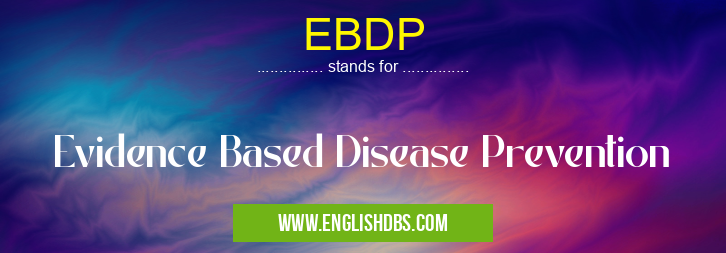What does EBDP mean in DISEASES
Evidence Based Disease Prevention (EBDP) is an approach to preventing disease that is based on science and data. It puts the emphasis on public health issues and seeks to create effective interventions that reduce the risk of developing or contracting a disease. EBDP uses data and research to inform policymakers, clinicians, community leaders, and other stakeholders about the best ways to prevent and treat diseases.

EBDP meaning in Diseases in Medical
EBDP mostly used in an acronym Diseases in Category Medical that means Evidence Based Disease Prevention
Shorthand: EBDP,
Full Form: Evidence Based Disease Prevention
For more information of "Evidence Based Disease Prevention", see the section below.
Essential Questions and Answers on Evidence Based Disease Prevention in "MEDICAL»DISEASES"
What is Evidence Based Disease Prevention (EBDP)?
EBDP is an approach to preventing and treating disease that is based on scientific evidence. It places an emphasis on public health issues such as infection control, vaccination programs, and changing behaviors to reduce the risk of developing or contracting a disease.
How does EBDP differ from traditional prevention models?
Traditional prevention models often rely heavily on anecdotal information or personal observations rather than scientific evidence when designing interventions for public health issues. EBDP takes a more systematic approach by using data and research as its primary source of information when making decisions about how to address diseases in communities.
What types of interventions are used with EBDP?
Interventions used with EBDP can include educational campaigns, immunization programs, screening services, outreach activities, behavior change strategies like increasing physical activity or smoking cessation programs, policy changes, and other initiatives designed to improve population health outcomes.
Who uses EBDP?
EBDP is used by many different stakeholders including healthcare providers, policymakers, community organizations, researchers, educational institutions, businesses, media outlets, and individuals looking for ways to protect their own health as well as that of their communities.
Where can I learn more about Evidence Based Disease Prevention?
There are many resources available including books from healthcare professionals or public health experts; websites providing evidence-based information; government agencies such as the Centers for Disease Control (CDC); professional organizations like the American Public Health Association; academic journals; conferences; lectures; webinars; political discourse; national media campaigns; social media sites; etc.
Final Words:
Through use of data collection methods such as surveys or laboratory tests combined with research studies conducted in laboratories or out in the field among populations at risk for chronic illnesses or communicable diseases such as tuberculosis or HIV/AIDS,EBPD offers an effective strategy for educating individuals around the world in order to provide effective preventive measures against various forms of illnesses before they become serious enough to require medical intervention. Ultimately this type of preventative care can lead to better overall quality of life,increased economic stability,and minimized financial burden due overcrowded medical systems with limited resources as well as improved global standing among developed countries.
